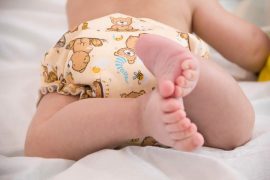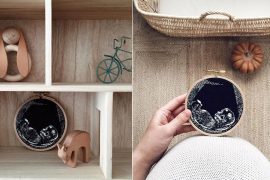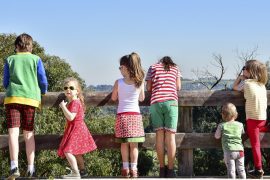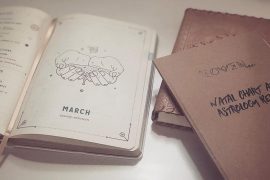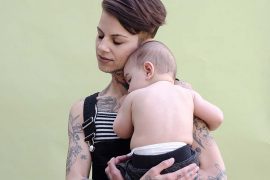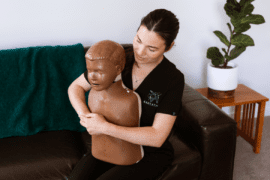Cloth nappies bring with them the issues of release of microplastics through washing (depending on what cloth your cloth nappies are made from, and also the electricity and water use of actually making them reusable). Some preliminary research suggests that the microplastics issue may not be enormous for cloth nappies, unless they’re fleece – disposables frequently contain much more plastic. At least in New Zealand, a large proportion of our electricity comes from renewable sources (all that rain has got to be good for something, right?). There’s no getting around the water used in washing, though – and no-one likes a dirty diaper.

So, what’s a climate-change-conscious parent to do? Most parents are unwilling or unable to let their baby go nappy-free (I can’t imagine any day-care centre that would allow such a thing, for a start). But there is a happy medium that can reduce your baby’s impact on the environment: elimination communication plus cloth. Babies may not be able to hold on to their waste products, but they don’t eliminate without signalling that they’re about to do so. There’s methane-production (farts, to you and me), grizzling, squirming and pushing away from you if you’re holding your baby, and making faces. Plenty of cues that baby needs to get rid of some poo or pee, pronto. Timing works well, too – most of us, babies included, need to eliminate when we wake up. If you are consistent with offering a potty or toilet to your baby, they’ll accept this as part of their normal routine. One day, sooner rather than later, you’ll remove the eco-friendly cloth nappy from your darling one’s bottom, put them on a potty, and realise that the nappy is both clean and dry. You’re one nappy closer to saving the world! Bask in the glow of virtue-signalling combined with actual virtue.

There’s another advantage here: babies who grow up with their parents practising elimination communication tend to be potty-trained much earlier than their fully-nappied cohorts – many by 12 months or so. That means months or years less nappy time. Hundreds less disposables, if that’s what you use; hundreds less washes, if you’re a cloth user. All in all, tonnes less wastewater or landfill will be used by your pottied baby.
What’s not to like? Start communicating with your baby today. Starting is easy with Elimination Communication Babies’ step-by-step book.
Elimination Communication Babies offers an easy-to-follow book to help you start elimination communication with baby from birth or any age stage up to around 18 months. It covers the various designs for cloth nappies including what material options are available, and which are more sustainable. It’s written for busy parents with a touch of humour, because potty learning with elimination communication is fun. Further support is offered through online Facebook training and their support network at Elimination Communication Babies Support. Join their supportive communities on Facebook and Instagram.

